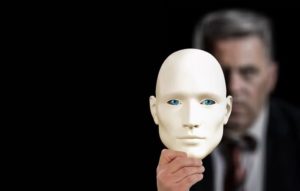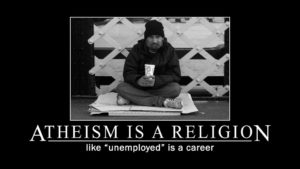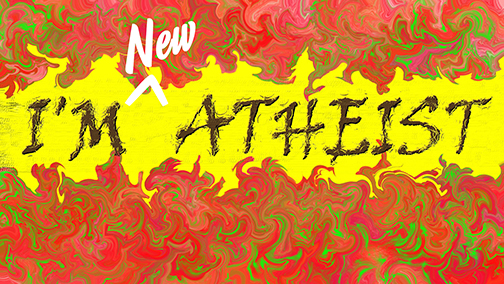It Began with a Telephone Call
In 2003 a study was conducted by the American Mosaic Project, which was to be the first in a series of national studies of race, religion, and diversity. In a random telephone sampling of 2,081 households nationwide, 90% of those polled thought that those of Caucasian descent and those of African descent could share their vision of society. Approximately 80% responded with the inclusion of Hispanics, Jews, and conservative Christians. Over 70% felt the same way about immigrants in general. 64% even believed the same of Muslims, in spite of the study taking place in the wake of the attacks on 9/11/01.
Oddly enough, however, Atheists rated below all of these groups, is considered the least likely to share their vision of society, being the group most Americans would least want their children to marry, and many responded that they, in fact, “believe atheists have no sense of community and promote cultural elitism and the almighty dollar.”
Why So Serious?
Penny Edgell, an associate professor of sociology at the University of Minnesota, who was in charge of the study, stated, “They are perceived to be on the other side of what Americans view as a symbolic moral boundary. They’re associated with moral and social disorder.”
This study was, in many ways, a wake-up call for many Atheists, who were surprised to be labeled in such a detestable light, presumably by their own fellow citizens, friends and neighbors. This prompted many prominent thinkers to put pen to paper to outline their reasons for their lack of belief. Thus began the New Atheist Movement. It was no longer about merely existing and staying out of the Religionists’ way; it became a fight against a prejudice that many didn’t realize was even happening.
A Familiar Backlash
When these Atheists began being outspoken about their reasons for not subscribing to any religion, there was indeed a counter-backlash. Popular conservative and Christian author Dinesh D’Souza uses these descriptions of new atheists in his 2007 book “What’s Wrong with Christianity?“:
“The atheists no longer want to be tolerated. They want to monopolize the public square and to expel Christians from it. They want political questions like abortion to be divorced from religious and moral claims. They want to control school curricula so they can promote a secular ideology and undermine Christianity. They want to discredit the factual claims of religion. […] In short, they want to make religion—and especially the Christian religion—disappear from the face of the earth.”
These are heavy accusations regarding an entire group of people, although it is not a new argument. Many of these same accusations have been made repeatedly against the Lesbian, Gay and Transgender movement, as well as various other religions who have come together as a group and spoken against unfair laws that cater specifically to Christian ideology. It is this vitriol that fuels the New Atheist to be more outspoken than ever before.
Relating to the Hate
Many Atheists are no longer content to be marginalized and not have their opinions heard. Religious privilege is so prevalent in the society that many do not realize it is even there, and are offended at the mere mention of its existence.

If one mentions that religious holidays are promoted above and beyond any secular holiday, one is accused of spoiling the fun for everyone.
When laws are created or upheld that have no basis in any religious viewpoint, one is labeled as promoting an immoral agenda. Yet, their impact would reach to those who do not share the same religious views, even if they are not specifically non-theistic.
Out of the Closet and Into the Light
In Richard Dawkins’ “Out Campaign”, his premise was to allow the world to see that they actually do trust Atheists all the time, every day; even if they are not aware.
 When one is labeled as completely untrustworthy because of an inability to believe in that which they cannot see or find evidence for, it is tempting to merely avoid the subject altogether to avoid a more personalized stigma. It is this stigma that the New Atheists wish to combat by being more outspoken about their lack of belief.
When one is labeled as completely untrustworthy because of an inability to believe in that which they cannot see or find evidence for, it is tempting to merely avoid the subject altogether to avoid a more personalized stigma. It is this stigma that the New Atheists wish to combat by being more outspoken about their lack of belief.
After the 2003 study, it became more important than ever to put a face on the term “Atheist” so that people would know exactly whom they were referring to when they assign them the label of “immoral” or “untrustworthy”. This issue continues to grow ever more important as continued legislation is passed and considered which holds beliefs of specific religions over that of the equal rights of all.
Whom Does it Hurt?
It is of great importance, when school curricula are discussed and approved, that they examine why certain aspects of history and science are being debated for inclusion. Is it because they are untrue, or is it to prevent acknowledgment of facts which may be uncomfortable to those of specific religions? If the latter is true, it certainly does not take into account all religious dogma; yet, the New Atheist Movement is the “New Kid on the Block” when it adds its voice of objection.
There is a need for Atheists to be outspoken and it is not necessarily to debunk religion, just as any group which is being misrepresented and marginalized needs to be outspoken, not merely to advocate its culture over another. There should be nothing to fear from another group emerging to state its premises on their view of the world. The New Atheist is one who wishes to bring these issues out of the dark and into the public eye.
New Atheism = New Religion?
Assertions of the organization and the widespread mobilization of Atheists seem to others to be dogmatic in nature. However, how can one cease to be mistrusted, if they do not speak out?
 How could the civil rights movement have been mobilized if those who were oppressed did not rock the boat and speak out loudly of their condition and of the widespread misrepresentation of their race and gender?
How could the civil rights movement have been mobilized if those who were oppressed did not rock the boat and speak out loudly of their condition and of the widespread misrepresentation of their race and gender?
If one is being criticized the appropriate measure to take is not to stay quiet. It is not up to Atheists to merely be “tolerated” and grateful for the opportunity. When a person’s culture and creed are not being recognized as a valid perspective, it is vital that they speak up and continue to do so until they are heard and understood. That is the essence of the New Atheist Movement.






